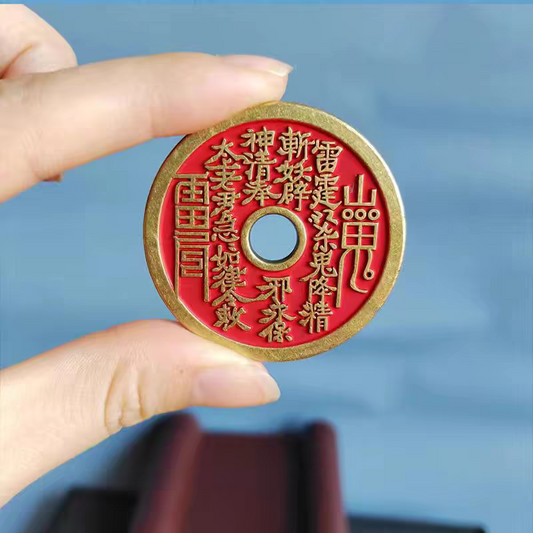
Daoist Emperor Wenchang: The Guardian Deity of Wisdom and Literary Fortune
paulpengAktie
In the vast system of Daoist deities, Emperor Wenchang is deeply respected and worshipped by people for his unique charm and important position.

Emperor Wenchang, also known in full as Emperor Wenchang of Zitong, is the deity in charge of the scholarly honors, official positions, and fortunes of scholars. His image is usually that of wearing an official robe, with a kind face, and holding a ruyi scepter or a book scroll, symbolizing wisdom, talent, and scholarly honors.
The sacrificial function of Emperor Wenchang is manifested in many aspects. For students, he is the guardian of their studies. On the path of learning, students often pray to Emperor Wenchang for the opening of wisdom and progress in their studies. Whether facing important exams or pursuing the accumulation of knowledge, Emperor Wenchang is regarded as a deity who can give inspiration and assistance. Many students will go to worship at the Wenchang Temple on the eve of exams, hoping to receive the blessing of the emperor and perform at their best in the exams.

For literati and poets, Emperor Wenchang is even more a symbol of inspiring creative inspiration and enhancing literary accomplishment. He encourages people to study diligently and keep making progress, and show their value with brilliant works. In the process of literary creation, people believe that Emperor Wenchang can bestow upon them the power of a flowing spring of literary thoughts, making their works more profound and infectious.
From the perspective of the origin of Daoism, the belief in Emperor Wenchang has a profound historical foundation. The origin of Emperor Wenchang can be traced back to ancient star worship. The six stars of Wenchang above the Big Dipper are regarded as constellations in charge of literary fortune. As time goes by, people personified these stars and gave them specific images and divine functions. Emperor Wenchang was gradually formed in such a context.
Daoism incorporates Emperor Wenchang into the divine system, further enriching his divine functions and symbolic meanings. In Daoist teachings, Emperor Wenchang not only controls the literary fortune of the human world but also is responsible for supervising people's moral cultivation and behavioral norms. He advocates that people take morality as the foundation and knowledge as the power, and realize the value of life through their own efforts and practice.

At the same time, the practice methods of Daoism are also combined with the belief in Emperor Wenchang. Through practice methods such as chanting scriptures, reciting mantras, and sitting in meditation, people can establish a spiritual connection with Emperor Wenchang and obtain his blessings and guidance. In the process of practice, people can not only improve their wisdom and morality but also feel the profoundness of Daoist culture.
In modern society, the belief in Emperor Wenchang still has important significance. Although we live in an era of highly developed technology, the pursuit of knowledge and wisdom has never stopped. The belief in Emperor Wenchang reminds us to attach importance to education, study diligently, and continuously improve our comprehensive qualities. At the same time, it also inspires us to maintain firm beliefs and a positive attitude in the face of difficulties and challenges and bravely pursue our dreams.
In short, as the guardian deity of wisdom and literary fortune in Daoism, Emperor Wenchang carries people's desires for knowledge, talent, and success. His belief not only reflects the profound connotations of Daoist culture but also provides us with a spiritual sustenance and source of motivation. On the road to pursuing a better life, let us pray to Emperor Wenchang for wisdom and strength with awe and strive to realize our life values.

Emperor Wenchang, also known in full as Emperor Wenchang of Zitong, is the deity in charge of the scholarly honors, official positions, and fortunes of scholars. His image is usually that of wearing an official robe, with a kind face, and holding a ruyi scepter or a book scroll, symbolizing wisdom, talent, and scholarly honors.
The sacrificial function of Emperor Wenchang is manifested in many aspects. For students, he is the guardian of their studies. On the path of learning, students often pray to Emperor Wenchang for the opening of wisdom and progress in their studies. Whether facing important exams or pursuing the accumulation of knowledge, Emperor Wenchang is regarded as a deity who can give inspiration and assistance. Many students will go to worship at the Wenchang Temple on the eve of exams, hoping to receive the blessing of the emperor and perform at their best in the exams.

For literati and poets, Emperor Wenchang is even more a symbol of inspiring creative inspiration and enhancing literary accomplishment. He encourages people to study diligently and keep making progress, and show their value with brilliant works. In the process of literary creation, people believe that Emperor Wenchang can bestow upon them the power of a flowing spring of literary thoughts, making their works more profound and infectious.
From the perspective of the origin of Daoism, the belief in Emperor Wenchang has a profound historical foundation. The origin of Emperor Wenchang can be traced back to ancient star worship. The six stars of Wenchang above the Big Dipper are regarded as constellations in charge of literary fortune. As time goes by, people personified these stars and gave them specific images and divine functions. Emperor Wenchang was gradually formed in such a context.
Daoism incorporates Emperor Wenchang into the divine system, further enriching his divine functions and symbolic meanings. In Daoist teachings, Emperor Wenchang not only controls the literary fortune of the human world but also is responsible for supervising people's moral cultivation and behavioral norms. He advocates that people take morality as the foundation and knowledge as the power, and realize the value of life through their own efforts and practice.

At the same time, the practice methods of Daoism are also combined with the belief in Emperor Wenchang. Through practice methods such as chanting scriptures, reciting mantras, and sitting in meditation, people can establish a spiritual connection with Emperor Wenchang and obtain his blessings and guidance. In the process of practice, people can not only improve their wisdom and morality but also feel the profoundness of Daoist culture.
In modern society, the belief in Emperor Wenchang still has important significance. Although we live in an era of highly developed technology, the pursuit of knowledge and wisdom has never stopped. The belief in Emperor Wenchang reminds us to attach importance to education, study diligently, and continuously improve our comprehensive qualities. At the same time, it also inspires us to maintain firm beliefs and a positive attitude in the face of difficulties and challenges and bravely pursue our dreams.
In short, as the guardian deity of wisdom and literary fortune in Daoism, Emperor Wenchang carries people's desires for knowledge, talent, and success. His belief not only reflects the profound connotations of Daoist culture but also provides us with a spiritual sustenance and source of motivation. On the road to pursuing a better life, let us pray to Emperor Wenchang for wisdom and strength with awe and strive to realize our life values.









